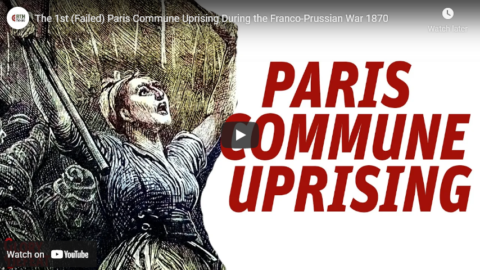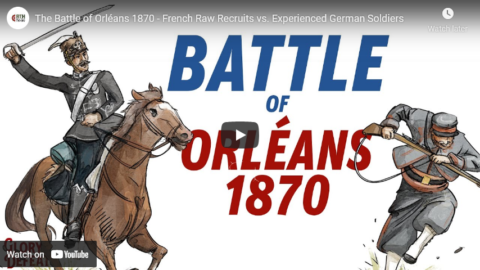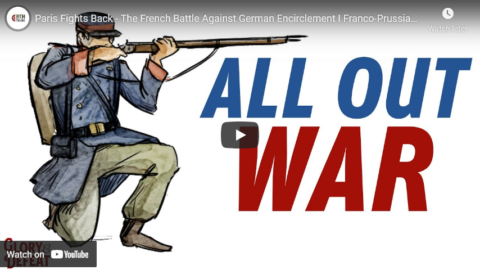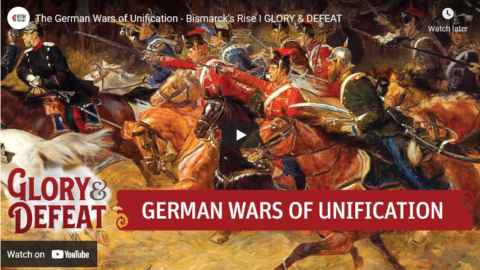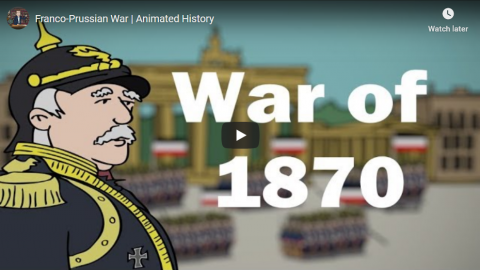Real Time History
Published 4 Nov 2021Sign up for Curiosity Stream and get Nebula bundled in and SAVE 26%: https://curiositystream.com/realtimeh…
The Siege of Paris during the Franco-Prussian War 1870 and the downfall of the French Empire after the Battle of Sedan created a volatile social situation in the French capital. And in November 1870 this situation erupted in an attempt to topple the provisional government and create a self-ruling Paris Commune.
» THANK YOU TO OUR CO-PRODUCERS
John Ozment
James Darcangelo
Jacob Carter Landt
Thomas Brendan
James Giliberto
Kurt Gillies
Albert B. Knapp MD
Tobias Wildenblanck
Richard L Benkin
Scott Deederly
John Belland
Adam Smith
Taylor Allen
Jim F Barlow
Rustem Sharipov» OUR PODCAST
https://realtimehistory.net/podcast – interviews with historians and background info for the show.» LITERATURE
Arand, Tobias: 1870/71. Die Geschichte des Deutsch-Französischen Krieges erzählt in Einzelschicksalen. Hamburg 2018Gouttman, Alain: La grande défaite. Paris 2015
Spiekermann, Uwe: “Die wahre Geschichte der Erbswurst”, unter: https://uwe-spiekermann.com/2018/05/1… (zuletzt besucht am 21.9.2021)
» SOURCES
Chuquet, Arthur: La Guerre 1870-71. Paris 1895Fontane, Theodor: Der Krieg gegen Frankreich. Bd. 3. Berlin 1878
Goncourt, Edmond de: Journal des Goncourts. II.1. 1870-1871. Paris 1890
Hérisson, Maurice d’: Journal d’un officier d’ordonnance. Paris 1885
Heylli, Georges d’ (ed.): M. Thiers à Versailles: l’armistice. Paris 1871
Kürschner, Joseph (Hrsg.): Der große Krieg 1870-71 in Zeitberichten. Leipzig o.J. (1895)
Meisner, Heinrich Otto (Hrsg.): Kaiser Friedrich III. Das Kriegstagebuch von 1870/71. Leipzig 1926
N.N.: Bismarcks Briefe an seine Gattin aus dem Kriege 1870/71. Stuttgart, Berlin 1903
Schikorsky, Isa (Hrsg.): “Wenn doch dies Elend ein Ende hätte”. Ein Briefwechsel aus dem Deutsch-Französischen Krieg 1870/71. Köln, Weimar, Wien 1999
» OUR STORE
Website: https://realtimehistory.net»CREDITS
Presented by: Jesse Alexander
Written by: Cathérine Pfauth, Prof. Dr. Tobias Arand, Jesse Alexander
Director: Toni Steller & Florian Wittig
Director of Photography: Toni Steller
Sound: Above Zero
Editing: Toni Steller
Motion Design: Philipp Appelt
Mixing, Mastering & Sound Design: http://above-zero.com
Maps: Battlefield Design
Research by: Cathérine Pfauth, Prof. Dr. Tobias Arand
Fact checking: Cathérine Pfauth, Prof. Dr. Tobias ArandChannel Design: Battlefield Design
Contains licensed material by getty images
All rights reserved – Real Time History GmbH 2021
November 5, 2021
The 1st (Failed) Paris Commune Uprising During the Franco-Prussian War 1870
October 15, 2021
The Battle of Orléans 1870 – French Raw Recruits vs. Experienced German Soldiers
Real Time History
Published 14 Oct 2021All across France French Armies have been raised from any available troops. From international volunteers to raw teenaged recruits. How these sub-par soldiers fare against professional German soldiers is not hard to guess and we can see how that goes in the first battles for Orléans.
Special Thanks to Jonathan Ferguson from Royal Armouries. Check out their Channel: https://www.youtube.com/RoyalArmouries
» THANK YOU TO OUR CO-PRODUCERS
John Ozment
James Darcangelo
Jacob Carter Landt
Thomas Brendan
James Giliberto
Kurt Gillies
Albert B. Knapp MD
Tobias Wildenblanck
Richard L Benkin
Scott Deederly
John Belland
Adam Smith
Taylor Allen
Jim F Barlow
Rustem Sharipov» OUR PODCAST
https://realtimehistory.net/podcast – interviews with historians and background info for the show.» LITERATURE
Arand, Tobias: 1870/71. Der Deutsch-Französische Krieg erzählt in Einzelschicksalen. Hamburg 2018Milza, Pierre: L’année terrible. La guerre franco-prussienne. Septembre 1870 – mars 1871. Paris 2009
» SOURCES
Bernhardt, Sarah: Mein Doppelleben. Leipzig 1908Hérisson, Maurice Graf d’: Journal d’un officier d’ordonannce. Juillet 1870 – Février 1871. Paris 1885
Kühnhauser, Florian: Kriegs-Erinnerungen eines Soldaten des königlich bayerischen Infanterie Leibregiments. Partenkirchen 1898 (Neudruck 2012)
Meisner, Heinrich Otto (Hrsg.): Kaiser Friedrich III. Das Kriegstagebuch von 1870/71. Berlin, Leipzig 1926
N.N. (Hrsg.): Theodor Fontane. Kriegsgefangen – Erlebtes 1870. Briefe 1870/71. Berlin (Ost) 1984
» OUR STORE
Website: https://realtimehistory.net»CREDITS
Presented by: Jesse Alexander
Written by: Cathérine Pfauth, Prof. Dr. Tobias Arand, Jesse Alexander
Director: Toni Steller & Florian Wittig
Director of Photography: Toni Steller
Sound: Above Zero
Editing: Toni Steller
Motion Design: Philipp Appelt
Mixing, Mastering & Sound Design: http://above-zero.com
Maps: Battlefield Design
Research by: Cathérine Pfauth, Prof. Dr. Tobias Arand
Fact checking: Cathérine Pfauth, Prof. Dr. Tobias ArandChannel Design: Battlefield Design
Contains licensed material by getty images
All rights reserved – Real Time History GmbH 2021
September 18, 2021
Paris Fights Back – The French Battle Against German Encirclement I Franco-Prussian War 1870
Real Time History
Published 16 Sep 2021Support Glory & Defeat: https://realtimehistory.net/gloryandd…
The German armies are on their way to encircle the French capital Paris after their victory at Sedan. The new French government is raising new troops all across the country and in Paris itself to stem the tide. Poorly equipped and poorly trained troops fight the Germans at Sceaux/Chatillon. Meanwhile, the German states start their negotiations for German unification.
» THANK YOU TO OUR CO-PRODUCERS
John Ozment
James Darcangelo
Jacob Carter Landt
Thomas Brendan» OUR PODCAST
https://realtimehistory.net/podcast – interviews with historians and background info for the show.» LITERATURE
Arand, Tobias: 1870/71. Die Geschichte des Deutsch-Französischen Krieges erzählt in Einzelschicksalen. Hamburg 2018Bourguinat, Nicolas/Vogt, Gilles: La guerre franco-allemande de 1870. Une histoire globale. Paris 2020
Gouttman, Alain. La grande défaite de 1870-1871. Paris 2015
Haselhorst, Olaf: Operationen der deutschen Heere im Krieg gegen Frankreich 1870/71, in: Der Deutsch-Französische Krieg 1870/71.
Vorgeschichte, Verlauf, Folgen, hrsg. v. J. Ganschow unter anderem Graz 2009, S. 83–120
Milza, Pierre: L’année terrible. Paris 2009
» SOURCES
Chuquet, Arthur: La Guerre 1870-71. Paris 1895Busch, Moritz: Bismarck und seine Leute während des Kriegs mit Frankreich Band. 1. Leipzig 1878.
Goncourt, Edmonde de: Memoires de la vie Litteraire. Paris 1890
Kriegsgeschichtliche Abtheilung des Großen Generalstabes (Hrsg.): Der deutsch-französische Krieg 1870-71. II.1 Berlin. 1878
Russell, William Howard: My diary during the last great war. London and New York, 1874
Sternegg, Generalmajor von: Schlachten-Atlas des 19. Jahrhunderts. Band 10. Deutsch-Französischer Krieg1870/71. Leipzig u.a. o.J. [1885]
» OUR STORE
Website: https://realtimehistory.net»CREDITS
Presented by: Jesse Alexander
Written by: Cathérine Pfauth, Prof. Dr. Tobias Arand, Jesse Alexander
Director: Toni Steller & Florian Wittig
Director of Photography: Toni Steller
Sound: Above Zero
Editing: Toni Steller
Motion Design: Philipp Appelt
Mixing, Mastering & Sound Design: http://above-zero.com
Maps: Battlefield Design
Research by: Cathérine Pfauth, Prof. Dr. Tobias Arand
Fact checking: Cathérine Pfauth, Prof. Dr. Tobias ArandChannel Design: Battlefield Design
Contains licensed material by getty images
All rights reserved – Real Time History GmbH 2021
August 9, 2021
The German Wars of Unification – Bismarck’s Rise I GLORY & DEFEAT
realtimehistory
Published 19 Jul 2021Support Glory & Defeat: https://realtimehistory.net/gloryandd…
After the failed revolution of 1848, the German states within the German confederation were still moving towards unification. This movement would come from the citizens this time though but from the top. Prussia’s chancellor Otto von Bismarck was using clever and aggressive diplomacy to outmaneuver his biggest German rival: Austria.
» OUR PODCAST
https://realtimehistory.net/podcast – interviews with historians and background info for the show.» LITERATURE
Arand, Tobias: 1870/71. Der Deutsch-Französische Krieg erzählt in Einzelschicksalen. Hamburg 2018
Bremm, Klaus-Jürgen: 1866. Bismarcks Krieg gegen die Habsburger. Darmstadt 2016
Buk-Swienty: Schlachtbank Düppel. Geschichte einer Schlacht. Hamburg 2015
Fesser, Gerd: Königgrätz – Sadowa. Bismarck Sieg über Österreich. Berlin 1994» SOURCES
Böhme, Helmuth (Hrsg.): Die Reichsgründung. dtv-Dokumente. München 1967Dollinger, Hans: Das Kaiserreich. Seine Geschichte in Texten, Bildern und Dokumenten. München, 1966
Hardtwig, Wolfgang /Hinze, Helmuth (Hrsg.): Deutsche Geschichte in Quellen und Darstellungen. Bd. 7: Vom Deutschen Bund zum Kaiserreich 1815 – 1871. Stuttgart 1997
Huber, Ernst Rudolf (Hrsg.): Dokumente der Verfassungsgeschichte, Bd. 2. 1851 – 1900. Stuttgart u.a. 1961
N.N.: Helmuth von Moltkes Briefe an seine Braut und Frau. Stuttgart u.a. 1911
Low, Sidney / Sanders Lloyd C.: The History of England During the Reign of Victoria (1837-1901) Volume 12 of 12, [Part of Series: The Political History of England in Twelve Volumes, Edited by William Hunt and Reginald L. Poole], Longmans, Green, and Co., London. 1907
» OUR STORE
Website: https://realtimehistory.net»CREDITS
Presented by: Jesse Alexander
Written by: Cathérine Pfauth, Prof. Dr. Tobias Arand, Jesse Alexander
Director: Toni Steller & Florian Wittig
Director of Photography: Toni Steller
Sound: Above Zero
Editing: Toni Steller
Motion Design: Philipp Appelt
Mixing, Mastering & Sound Design: http://above-zero.com
Maps: Battlefield Design
Research by: Cathérine Pfauth, Prof. Dr. Tobias Arand
Fact checking: Cathérine Pfauth, Prof. Dr. Tobias ArandChannel Design: Battlefield Design
Contains licensed material by getty images
All rights reserved – Real Time History GmbH 2021
August 5, 2021
The Ems Dispatch – The Outbreak of the Franco-Prussian War I GLORY & Defeat Week 1
realtimehistory
Published 13 Jul 2021Support Glory & Defeat: https://realtimehistory.net/gloryandd…
French and Prussian animosity have been swelling in the background since the German Wars of Unification started in the 1860s. The French Duc de Gramont hopes that a victory over Prussia could restore French prestige while Prussian Chancellor Bismarck needs a reason to fulfill his dream of German unification from above. When the crisis about the Spanish throne escalates with the Ems Dispatch, the die is cast and the Franco-Prussian War begins.
» OUR PODCAST
https://realtimehistory.net/podcast – interviews with historians and background info for the show.» LITERATURE
Arand, Tobias: 1870/71 – Die Geschichte des Deutsch-Französischen Krieges erzählt in Einzelschicksalen. Hamburg 2018Böhme, Helmut: (Hrsg.): Die Reichs-gründung. dtv-Dokumente. München 1967
Gall, Lothar (Hrsg: Deutschland Archiv). Kaiserreich Bd. I. o.O. 2007
Girard Louis: Napoléon III. Paris 1986
Mährle, Wolfgang (Hrsg.): Nation im Siegesrausch. Württemberg und die Gründung des Deutschen Reiches 1870/71. Stuttgart 2020
Milza, Pierre: L’année terrible. La guerre franco-prussienne septembre 1870 – mars 1871. Paris 2009
» SOURCES
Fontane, Theodor: Der Krieg gegen Frankreich Bd. I. Berlin 1873Louis L. Snyder, ed., Documents of German History. New Brunswick, N.J.: Rutgers University Press, 1958
» OUR STORE
Website: https://realtimehistory.net»CREDITS
Presented by: Jesse Alexander
Written by: Cathérine Pfauth, Dr. Tobias Arand, Jesse Alexander
Director: Toni Steller & Florian Wittig
Director of Photography: Toni Steller
Sound: Above Zero
Editing: Toni Steller
Motion Design: Philipp Appelt
Mixing, Mastering & Sound Design: http://above-zero.com
Maps: Battlefield Design
Research by: Cathérine Pfauth, Prof. Dr. Tobias Arand
Fact checking: Cathérine Pfauth, Prof. Dr. Tobias ArandChannel Design: Battlefield Design
Contains licensed material by getty images
All rights reserved – Real Time History GmbH 2021
July 30, 2021
QotD: Bismarck on history
A statesman has not to make history, but if ever in the events around him he hears the sweep of the mantle of God, then he must jump up and catch at its hem.
Otto von Bismarck
June 12, 2021
QotD: The assassination attempt(s) on Bismarck
… 19th-century history, particularly the years from the 1848 revolutions to the outbreak of the First World War in 1914. The key was Bismarck, the Prussian minister-president who unified Germany. If you want to learn about Bismarck, you will probably pick up a book by some historian of international relations, such as A.J.P. Taylor. That’s the right place to start. But it means you can read a lot about Bismarck before finding out about the time in May 1866 when a guy shot him.
Ferdinand Cohen-Blind, a Badenese student of pan-German sentiments, waylaid Bismarck with a pistol on the Unter den Linden. He fired five rounds. None missed. Three merely grazed his midsection, and two ricocheted off his ribs. He went home and ate a big lunch before letting himself be examined by a doctor.
But even the books that condescend to mention this triviality may not tell you about the other time a guy shot Bismarck: A young Catholic tried to kill him in July 1874, during the anti-Catholic Kulturkampf Bismarck had engineered, but only managed to score his right hand with a bullet.
The point is not that Bismarck was particularly hated, although he was. The point is that this period of European (and American) history was crawling with young, often solitary male terrorists, most of whom showed signs of mental disorder when caught and tried, and most of whom were attached to some prevailing utopian cause. They tended to be anarchists, nationalists or socialists, but the distinctions are not always clear, and were not thought particularly important. The 19th-century mind identified these young men as congenital conspirators. It emphasized what they had in common: social maladjustment, mania, an overwhelming sense of mission and, usually, a prior record of minor crimes.
[…]
Bismarck was not much of a democrat, but his example is instructive. He was so phlegmatic about being shot that he obtained both of the guns he had been shot with. He kept them in his desk, ready for use against a third guy with the same bright idea.
Colby Cosh, “Those old terrorist tendencies”, Maclean’s, 2014-12-07.
December 11, 2019
Franco-Prussian War | Animated History
The Armchair Historian
Published 4 Feb 2018What was the Franco Prussian War?
Our Website: https://www.thearmchairhistorian.com/
Our Twitter:
@ArmchairHistOur Discord:
https://discord.gg/Ppb2cUdSources:
https://www.britannica.com/event/Fran…
http://francoprussianwar.com/
http://history-world.org/franco_pruss…
http://www.newworldencyclopedia.org/e…
https://www.warhistoryonline.com/hist…
http://geacron.com/home-en/?v=m&lang=…Music: Music: Antonio Salieri: “Twenty six variations on La Folia de Spagna“
November 8, 2018
The Franco-Prussian War
Epic History
Published on 29 Dec 2015The Franco-Prussian War or Franco-German War, often referred to in France as the War of 1870 (19 July 1870 – 10 May 1871), was a conflict between the Second French Empire and the German states of the North German Confederation led by the Kingdom of Prussia. The conflict was caused by Prussian ambitions to extend German unification. Prussian chancellor Otto von Bismarck planned to provoke a French attack in order to draw the southern German states — Baden, Württemberg, Bavaria and Hesse-Darmstadt — into an alliance with the North German Confederation dominated by Prussia.
December 4, 2017
Otto von Bismarck – Lies – Extra History
Extra Credits
Published on 2 Dec 2017We’ve wrapped up our series on Otto von Bismarck, but we’ve only touched on the first half of his life! Maybe someday we’ll get to come back. Until then, James answers questions and discusses errors in this episode of Lies!
November 21, 2017
Otto von Bismarck – VI: Germany! – Extra History
Extra Credits
Published on 18 Nov 2017You would think that capturing the Emperor of France would end the war, but… no. Who could Bismarck negotiate with? Eventually he forced an interim government to cave to his demands, and at the same time convinced the rest of the German states to unite with Prussia.
November 13, 2017
Otto von Bismarck – V: Prussia Ascendant – Extra History
Extra Credits
Published on 11 Nov 2017The northern German states now looked to Prussia for leadership, but that power brought increased attention from their enemies. Bismarck engineered a war with France by striking at Napoleon III’s pride and wound up winning a runaway victory to secure Prussia’s diplomatic power.
November 6, 2017
Otto von Bismarck – IV: The Iron Chancellor – Extra History
Extra Credits
Published on 4 Nov 2017Bismarck turned up the heat on his long-term plan to unite the German Confederation under Prussian leadership. He allied with Austria to seize a piece of disputed land, then maneuvered them into a war that he decisively won. Even an assassination attempt could not stop him.
October 30, 2017
Otto von Bismarck – III: Iron and Blood – Extra History
Extra Credits
Published on 28 Oct 2017Bismarck was just starting to get the hang of diplomacy when the throne of Prussia passed to a new Frederick Wilhelm who promptly sent him away to Russia. But then Bismarck got tapped to serve as the Head of Government and began pushing for his great project: the unification of Germany.
October 22, 2017
Otto von Bismarck – II: A Man of Great Ideas – Extra History
Extra Credits
Published on 21 Oct 20171848. Revolution swept Europe as the working class rose up to claim their freedoms from an oppressive ruling class. But as a member of that ruling class, Bismarck had some resistance to this movement. He channeled his wild energy into productive avenues, gradually becoming the man of realpolitik that we know today.

